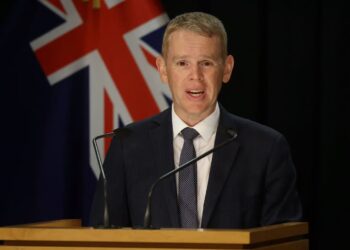Women across New Zealand wore makeshift hijabs as a statement of peace and solidarity on Friday, a week after a white supremacist killed 50 Muslims at two mosques in the southern city of Christchurch.
Rafaela Stoakes, a 32-year-old mother of two, said wearing the Islamic head covering gave her a small insight into what it means to stand out and feel part of the minority.
On Friday morning she covered all but a few locks of her dark chestnut-colored hair in a loose red and white scarf, crossed neatly beneath her chin and tucked into a black hiking jacket.
#HeadScarfforHarmony
She was one of many women embracing #HeadScarfforHarmony, to make a stand against the hate espoused by the Australian man accused of killing dozens of worshippers.
Headscarves were also worn as a mark of respect by policewomen and non-Muslim volunteers directing the crowds around the site in Christchurch holding communal prayers on Friday.
Dear New Zealanders Aotearoa – Being a Muslim, I’m overwhelmed. I have never seen this kind of solidarity in my entire life – The vigils, The Haka performances, The scarves. It’s just amazing and heartwarming.
Thank you.#HeadscarfForHarmony#ScarvesInSolidarity #NewZealand pic.twitter.com/kKuhNFTngQ
— Zaan (@BallayBazz) March 21, 2019
“It is amazing how different I felt for the short time I was out this morning,” Stoakes told AFP.
“There were a lot of confused looks and some slightly aggressive ones,” she said. “I did feel a sense of pride to honor my Muslim friends, but I also felt very vulnerable and alone as I was the only person wearing one.”
“It must take a lot of courage to do this on a daily basis.”
‘Strong Stand’
The gesture caught on nationwide – in offices, schools and on the streets – as well as at the ceremonies held in Christchurch to mark one week since the killings at the hands of a self-avowed white supremacist.
Women flooded Twitter, Facebook and other social media – which played a key role in allowing the gunman to spread his message – with their images.
Kate Mills Workman, a 19-year-old student from Wellington, posted a selfie on Twitter wearing a green headscarf.
#ThankYou Zealanders and PM @jacindaardern being a muslim,I am overwhelmed.Never saw this kind of solidarity,leadership and compassion ever in my entire life. the vigils,the haka performances, the scarves. It is just amazing and heartwarming.#HeadscarfForHarmony pic.twitter.com/zaIYzL0Xs2
— you (@youryour615) March 22, 2019
“If I could I would be attending the mosque and standing outside to show my support for my Muslim whanau but I’ve got lectures and I can’t really skip them,” she told AFP, using a Maori language term for extended family.
“Obviously this is all spurred on by the terrible tragedy in Christchurch, but it’s also a way of showing that any form of harassment or bigotry based on a symbol of religion is never okay,” she added.
“As New Zealanders, we have to make a really strong stand.”
Although the headscarf has been the subject of contentious debate over gender rights in the Islamic world, for Stoakes the day has been a lesson in how pious Muslim women often do not have the option to melt away into the background when they feel vulnerable.
“We can nod and pretend to agree with people who we are afraid of, or plead ignorance if we feel in danger of confrontation,” she said.
“But a Muslim is just right out there. Like a bullseye. Their hijabs and clothing speak before they do.”
More on the Subject
Four days after the attack, on the outskirts of the green lengths of Hagley Park, a cordon remains at the road leading to the Al Noor mosque, where 42 people perished. The bright sun casts an unforgiving spotlight on ground zero of New Zealand’s darkest day. The black tarps that fence off the mosque contrast sharply with the building’s golden dome glinting against the blue sky.
Christchurch, Terrorism, and Resilience: ‘We Don’t Have Time to Hate’
























